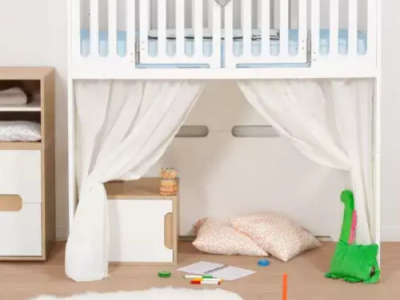
Baby does not want to sleep in his bed: what to do?
Some children refuse to sleep in their bed when it comes time to go to bed at night. Others want to go to their parents' bed in the middle of the night.

With patience, it is possible to change these habits when they no longer suit parents.
Some mothers dream that their baby sleeps alone in his room, preferably overnight. However, getting your child to sleep, especially at night, is not that easy. Newborns don't know which is day and which is night, and even though they sleep 15 to 18 hours a day, the few hours they stay awake are usually only 12 hours. 'dawn. So how do you get baby to sleep in his bed?
If you are a first-time mum, you are bound to have a lot of doubts, especially when it comes to sleeping problems of your child. How to put him to sleep? How to get uninterrupted sleep?
Baby Loves Being In Your Arms
Your baby discovers the world in a "sensory" way.
They love the warmth and softness of your arms. We're talking about your arms because your baby can already tell the difference between you and others. It can recognize your scent or the way you hold it. This is where you have to be careful. If you're used to your baby sleeping in your arms, he'll have a harder time finding the same feeling in the crib, so he'll have a harder time falling asleep.
Learn to sleep in bed
For children, bedtime is often seen as a separation from their parents. Then they may feel a little anxious and not want to sleep alone; in bed. However, it is important that the toddler learns to manage this anxiety and understands that he is able to sleep alone. This learning will also help them feel empowered to take on other challenges.
The earlier you learn about sleep autonomy, the more likely your child is to sleep well. Indeed, the habits that weaken sleep will not have had time to settle. In addition,if he is able to fall asleep alone at night, the toddler will manage to self-soothe during his nocturnal awakenings.
In the case of a child who has slept in his parents' bed for a long time, it is normal for the transition to his own bed to be more difficult. It is then of course necessary to accompany the toddler with love and patience.
What to do when baby does not want to sleep in his bed?

Try to reduce the difference between the arms and the bed. You are not a bed! Try to make subtle changes. Your arms are warm and comfortable, so the bed can get cold and uncomfortable. Therefore, you must facilitate this transition. Your baby needs to be happy and warm with clothes that remind him of your presence. A sleeping bag or sleeping bag is enough. Ideally, spend a few nights with this garment to impregnate it with your perfume and use it to dress baby.
If your baby continues to protest, stay with him for a few minutes to comfort him.</ strong> You can put your hands on his little belly, but avoid putting your arms around him. Otherwise, your efforts will be in vain.
Note: Do not put blankets or pillows in the bed. There is an increased risk of choking.
Why do newborns sleep so much?
The truth is, babies' sleep patterns differ because they don't follow the circadian rhythms that dominate the life cycle of most adults. Sleepless nights can take months for a baby to understand the natural flow of day and night.
In addition, during the first few months, the baby's sleep cycle will be shorter (about 50 to 60 minutes, which is half the length of an adult's sleep cycle) and the duration of deep sleep will be significantly shorter.
This means that your baby can easily wake up. 50% of sleep time is spent in REM sleep. REM sleep is characterized by rapid eye movements, irregular breathing, and occasional body movements or vocalizations (the famous grunts that babies make while sleeping and that parents delight in).

But what exactly does all this mean? The baby won't be able to sleep through the night?
In fact, this information proves what parents quickly discover when they try to put their child to sleep:
- Babies sleep very lightly;
- The 25 first minutes of sleep are the most critical phase of the cycle;
- Every 50 minutes the baby may have a slight awakening and go back to sleep without complications (or wake up for good and need comfort) .
Another important factor to consider is the baby's real need for sleep at each stage of life:
newborn : 17 hours a day (8 to 9 hours at night, almost never without a break);
1 month: 17 hours a day (at least 9 hours at night);
3 months: 16 hours a day (10 hours at night);
6 months: 15 hours a day (10 hours at night);
Some basic principles can help you make bedtime enjoyable:

- Have a well-defined rhythm
- Set up a ritual
- Give him time to fall asleep
- Don't wait until he is exhausted
- Do not systematically pick him up
- Reassure him
- Trust yourself
- The bed should not be a punishment< /li>
- Both of you be consistent
- If you need to, give the pacifier
- Avoid overfeeding
- Keep the room dark at bedtime
- Watch the room temperature (ranging from 18º to 24º C)
- Keep the room quiet
Teaching a baby to sleep in their crib takes patience, consistency and lots of love.



